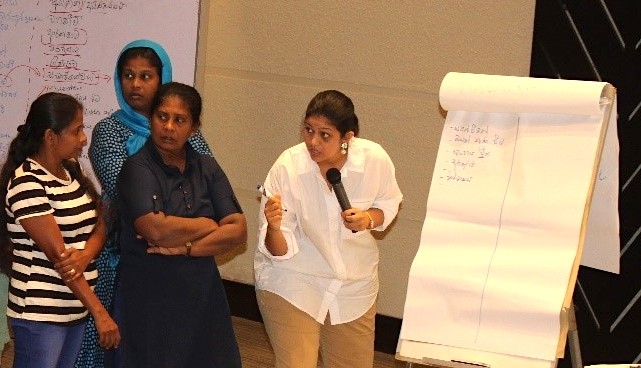A country that is rich in diverse ethnicities and religions requires a democratic governing system that ensures a plural society, meaning a living in a shared space while respecting each other’s diversity.
In Sri Lanka, women consist of 52 percent of the population. Since they play a vital role at the community level, women’s voices need to be included in the reform agenda and in decision making. However, their voices are often not heard at the national or sub-national level.
NPC’s project, Women Organised for Inclusion through Community Engagement (WOICE), supported by National Endowment for Democracy (NED), aims at capacitating, mentoring and strengthening selected groups of sub-national women civic leaders as super activists. The project selected 42 women based on their experience in community engagement and their commitment to serving society. By giving knowledge on democracy and democratic values, pluralism and inclusion, gender and women’s roles while identifying modes of citizenship, it is expected that these women leaders will gain skills to resolve existing issues in their communities.
The first Training of Trainers (TOT) programme on democracy, pluralism, gender and inclusion was held for participants from the districts of Matara, Monaragala, Kandy, Nuwara Eliya, Ratnapura, Kegalle and Gampaha. Facilitating the training were Mr. Shashik Silva and Ms. Kaushini Dammalage senior researchers of the Social Scientist Association, Mr. Upul Abeyrathne professor at the University of Peradeniya, Dr. Jehan Perera NPC Executive Director, Mr. V. Weerasinghem trainer on gender and inclusion and Dr. Pavithra Jayawardhena lecturer at the University of Colombo.
The participants were taught the theoretical and conceptual background of democracy and pluralism in order to address the issues related to the violation of democracy by identifying their gender roles as women. With the new understanding, they will be equipped to develop their own ways of solving issues in future.
Looking at women from the plantation sector, for example, they rarely have opportunities to come out of their estates. One reason for this is that they do not have access to proper education about their rights and what can be done when their rights are violated.
Educating both women and men on their rights will improve overall services in the public sector. For instance, some parents do not know how to get a birth certificate or a national identity card for their child.
Manori Thanthrige, Super Group Member in the Nuwara Eliya District said, “During the training programme we identified the importance of mobilising and empowering women’s groups because they face many issues. We learnt about the challenges we face and how to resolve them.” P.G. Podinona, Super Group Member from Monaragala, said women had little knowledge of democracy and pluralism. “It was not clear what the suitable way forward as a women’s group is. This training programme improved my knowledge and clarified some of the doubts I had. I will be more effective in delivering good services and I will be able to train our women’s groups.”

